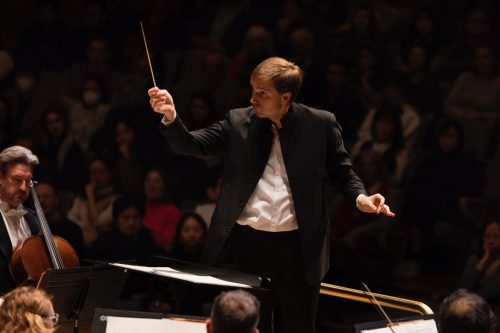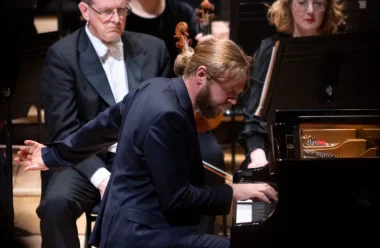United Kingdom Smyth, Rachmaninoff, Elgar: Denis Kozhukhin (piano), Royal Philharmonic Orchestra / Vasily Petrenko (conductor), Royal Pageant Corridor, London, 27.3.2024. (MBr)

Smyth – The Wreckers, Overture
Rachmaninoff – Piano Concerto No.3
Elgar – Symphony No.2
This live performance was fairly superlative – however it actually was not fairly what it was imagined to have been. Yunchan Lim had been as a consequence of play Rachmaninoff’s Piano Concerto No.3, however a hand damage had compelled him to cancel his European Tour. Maybe I used to be slightly extra pissed off that I used to be not going to listen to him play the Chopin Études at Wigmore Corridor in April; I appear to seek out myself in one thing of a minority amongst my fellow critics (and particularly audiences) in being unable to genuflect fairly so rapidly to his interpretation of this concerto, particularly in some more moderen performances I’ve heard (one from Boston involves thoughts). Having stated that, I might have been very happy to have been proved incorrect.
However what a present of a efficiency of this endlessly fascinating concerto we did get from the Russian pianist Denis Kozhukhin. I usually take the view that should you not often get a nasty efficiency of this work you then not often get an ideal one both; Kozhukhin’s very virtually touched the latter. There may be, in reality, some similarity between Yunchan Lim and Kozhukin within the sense that each these pianists are very attuned to what’s going on inside the orchestra – each interact with it when a substantial variety of pianists by no means trouble to take action. The concept this can be a symphonic piano concerto is clearly not misplaced on both of them. But when Kozhukhin appears inside the orchestra he does one thing else too and that’s to have interaction along with his inside self; there was one thing deeply emotional and poetic about this efficiency that basically put it in fairly one other class. The Karajanesque closing of the eyes, the size of time he simply by no means spent trying on the keyboard in any respect once they had been open, gave this efficiency an infinite freedom and depth you not often encounter within the live performance corridor.
That freedom is partly there as a result of Rachmaninoff provides the pianist all of the house to be as elastic or as tight as he desires. Not like within the Second Concerto, the Third has no metronome markings. You didn’t, for instance, discover in Kozhukhin’s efficiency any correlation between the quick tempo he set for the opening bars and the noticeably measured one he set for the cadenza; with Evgeny Kissin it’s clear there’s a hyperlink. Though there may be by no means actually any motive why pianists ought to tackle the interpretations of their mentors or lecturers (Lim’s has little in widespread with Minsoo Sohn’s) so it’s additionally the case that Kozhukhin’s doesn’t share an excessive amount of with Kirill Gerstein’s, because it occurs the final pianist I heard on this concerto. But when any pianist did come to thoughts it was Yevgeny Mogilevsky (one of many best interpreters of the Third) and with whom Kozhukhin shares one thing of an inclination to spring from his stool – useful in case your proper hand doesn’t comfortably stretch to a low D on the different finish of the keyboard.

If this had been an unquestionably ‘Romantic’ efficiency, it was additionally one which was generally heavy on rubato – and I’m completely effective with that. The cadenza – the longer of the 2 – was an actual standout for this. This can be very uncommon to listen to such delicate taking part in of the f and mf bars, the dim and cres phrasing and even the accelerando – one thing a major variety of pianists are already doing by the cadenza’s seventeenth bar. There wasn’t a single tempo that Kozhukhin set right here – nor a single dynamic. If it was slower and considerably ‘bigger’ in scale than a traditional efficiency of this cadenza it was as a result of with a purpose to hit the colors he needed it might solely be this manner. Does he know the distinction between Presto and Allegro molto? Completely. The meno mosso simply rippled.
The second motion, too, was vastly spectacular. Not all pianists take such a poetic view of this music – and never one that appears again to a few of the Mendessohnian roots of the music, both. What maybe set the pianist up right here was Vasily Petrenko’s dealing with of the lengthy orchestral opening to the second motion, a few of the most tragic music Rachmaninoff wrote. He acquired superlative taking part in from the orchestra (magnificent strings) – and knew exactly the type of bleak darkness he was aiming for. I don’t suppose Kozhukhin lacked energy within the piu mosso part of the Intermezzo both – and there was once a very ‘Russian’ type of taking part in the ff passage earlier than the Maestoso that seems to have change into slightly retro today (that’s, not as written) however we acquired one thing near it.
The Finale alla breve had many effective issues in it, too – and once more a cadenza that was splendidly achieved. Tempi had been fleet for the opening, however not overly so; what was additionally noticeable right here was the dialog between the pianist and the woodwind and the cello in duets, not one thing that’s all the time so prominently achieved in performances, however in line with the panorama of Kozhukin’s interpretation. An attractive pianissimo earlier than the opening of the Meno mosso – unusually gentle, as if the fingers had been floating on air, however with the depth of the left-hand bass so wealthy – was magnificent. The leggiero appeared like being performed in double chords if not truly being achieved so.
That cautious rubato was once more there within the lengthy passages with marcato markings, with Kozhukhin pointedly taking part in the notes with emphases alongside these with none. The Piu vivo earlier than the concerto’s closing bars introduced one shock and that was neither conductor nor pianist sharing a single look at each other in a passage the place the concerto can simply crumble (and generally has). However this had been a efficiency of good chemistry and by no means as soon as did you are feeling it could ever accomplish that.
Pianistically, this had been a tour de pressure. However for Vasily Petrenko and the Royal Philharmonic it was a exceptional orchestral accompaniment – essentially the most memorable I’ve heard in current occasions. The taking part in was superlative. I might be very stunned if I hear a greater efficiency of this concerto for fairly a while.
Elgar’s Symphony No.2 has been a piece that Petrenko has performed earlier than – and one which seemingly travels properly with non-British conductors. The symphony’s Edwardianism isn’t the one means it may be interpreted; I warmed to Giuseppe Sinopoli’s Italianate glow, simply as I’ve to Tadaaki Otaka’s weightier one with the NHK Symphony Orchestra or Naoto Otoma’s extra ascetic view of it.
In a symphony that may badly veer astray in some performances Petrenko took a really fluid view of it and he was helped enormously by taking part in that was neither overly heavy nor susceptible to indulgent phrasing. Certainly, maybe there have been hints of one thing slightly Venetian that sprung from the symphony’s origins, and of the Shelley quote that prefaces the work – there was ample daylight on show right here, textures of sunshine shining by means of them, however but the despondency that’s generally on the coronary heart of this symphony might thunder out when it wanted to.
The primary motion was completely measured – it flowed with ease, neither sped up or slowed down with uncompromising mannerisms. There was a lilting grace right here, a horse gallop there; reflective passages merging with extra strident ones. Petrenko achieved some stunning taking part in – the ghostly, veiled writing within the muted strings; the weird impact of bell-like tone on the harps. Elgar achieves a type of terror in elements of this symphony’s opening motion that may be understated; Petrenko introduced it into the open so when the anguished fff climax arrived it did so with much more energy.
The Larghetto was intensely achieved, with mourning reflectivity and noble grace. Coy reserve and melancholic mistiness had been emphasised by very good string taking part in. The music could be stately and sorrowful – the drum roll, and chordal string passages recalling march rhythms, however it was by no means overplayed. Lamentation, contemplation and even grief emerged however in essentially the most diversified means. Some inside battle, and a return to terror, emerged within the third motion – it was taught, gripping with some great woodwind taking part in, songs that had been interjected with floating strings and punctuated brass. Petrenko achieved a degree of integration that was impressively proper: and there was volatility and violence however stored in verify.
The concision of the ultimate motion might be stuffed with drama – and over grandiose statements. Plenty of element got here by means of right here, and a richness within the taking part in that was spectacular (not least on the double basses). The stream was majestic and but had an virtually chamber-like high quality with sensible, flashing orchestral insights. From all that terror got here a non secular acceptance of tranquillity that was gloriously achieved.
The live performance’s opening work, Ethyl Smyth’s Overture to The Wreckers was presumably the least persuasive piece on the programme. Swashbuckling and a tad cinematic additionally it is distinctly underwhelming; the efficiency was effective sufficient.
A beautiful live performance – actually absolutely deserving a BBC Radio 3 broadcast, however so usually excluded from the schedule for some motive.
Marc Bridle

